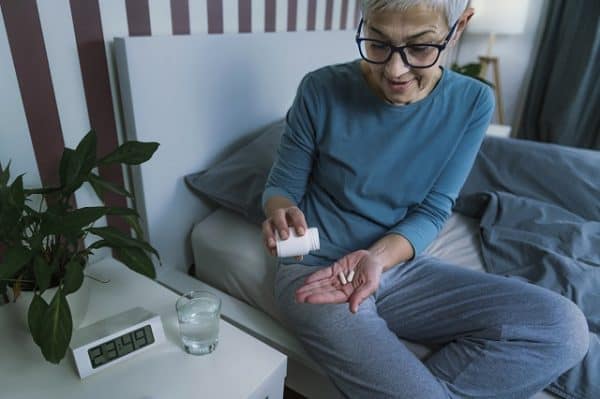
It’s well established that getting a sufficient amount of sleep is crucial in keeping one’s body at its healthiest state. Primarily, sleep allows one’s body to take a rest after an eventful day. It also helps it recover from physical stress and emotional strain. Aside from that, sleep also enables the body to function properly and keeps it in good condition.
However, numerous factors could impede one’s ability to get deep restful sleep at night. These may include unhealthy lifestyles, improper sleeping habits, and substance abuse. Consequently, one may suffer from health issues due to a constant lack of sleep. Fortunately, there are various alternatives you can consider to manage your sleeping patterns. This includes taking a Natural Sleep Aid and other similar sleep supplements.
For better ideas, you can continue reading this article.
Sleep And The Human Body
Although it may seem an easy task to accomplish, getting a sufficient amount of sleep could be challenging for many people. Although, its impacts may not be apparent in the first weeks. However, being unable to rest and achieve deep sleep could severely impact your health and overall wellness.
If left untreated, sleep deprivation may lead to long-term health issues and diseases. Without proper sleep, you may encounter potential problems which may include stroke, depression, immune system deterioration, and lower sex drive.
As the body struggles to keep up with chronic sleep deprivation, the possibility of contracting diseases may also continue to increase. Particularly, one becomes at risk of obesity, diabetes, hypertension, heart ailments, and other sleep disorders. Not just that, but constant lack of sleep may also affect one’s overall appearance. Over time, you might notice wrinkles and dark circles under your eyes.
Many experts also believe that lack of sleep could increase stress hormones or cortisol in the body. As the cortisol breaks down collagen, which protects and rejuvenates the skin, it might speed up the aging process.
Incredible Natural Sleep Aids
If you’re always having a hard time acquiring deep restful sleep at night, then that might be the right time to try other alternatives. For instance, you can consider taking sleep supplements like Magnesium Glycinate for Sleep disorders and other sleep problems. You may also monitor your sleeping habits to effectively know the potential causes of your condition.
To better protect yourself from such risks, it’d be better to address your condition as early as possible. Although, some people would opt for taking prescription drugs. Taking sleep supplements doesn’t fall short of maintaining your natural sleeping habits, not to mention its healthful benefits.
To better know how natural sleep aids differ from the latter option, continue reading below:
- Safer choice: Compared to over-the-counter prescription drugs that most people often take, natural sleep supplements are regarded as a safer choice for most people.
- Numerous health benefits: While there’s a conventional belief that sleep aids normally pose adverse effects to users, it’s important to know that natural sleep aids don’t have many negative effects on a person. Instead, they’re even known for providing numerous health benefits to people, including reducing risks of sleep deprivation, regulating mood and behaviors, and enhancing one’s circadian rhythm.
- No side effect for addiction: When taking natural sleep aids, you won’t have to worry about being dependent on them, as they’re said to pose no such threats to people, as long as you take them responsibly. Before taking any type of sleep aid or sleep supplement, you must first consult your doctor to avoid endangering your health.
When Take Natural Sleep Supplements
With their incredible uses and health advantages, the use of natural sleep aids and other types of sleep supplements are gaining popularity over the past decades. Now that you know what natural sleep aids are, the next thing you need to know is when to take them. Particularly, here are some of the most common signs you might require a natural sleep aid:
- Moodiness
You might’ve heard about the impacts of sleep deprivation on one’s mood and behavior. However, it’s been said that constant lack of sleep may result in extreme feelings of irritability, short-tempered, susceptibility to stress, and other mental health issues.
Although you may not notice it immediately, sleep deprivation might influence you to act impulsively and aggressively once provoked. This is mainly because of your unstable emotions. In most cases, sleep deprivation is believed to make people feel more stressed out, frustrated, angry, and tired.
Apart from that, sleep deprivation and other types of sleep disorders could also affect one’s mental state and behavior. For instance, people who often experienced sleeplessness are more at risk of feeling agitated and anxious, as well as unstable arousals.
Stress might also make the body feel alert and aroused, which results in an uncomfortable sleep. Likewise, people under chronic stress may have difficulty sleeping peacefully at night. If you’re noticing unusual patterns in your behavior, then you might need to take medication and sleep supplements.
- Anxiety
While some people may not know it, anxiety and intrusive thoughts are among the most common reasons behind sleep deprivation. Specifically, many people tend to lack proper sleep at night due to unpleasant thoughts and worry that often plague their sleep. Due to this, the cases of patients suffering from sleep disorders continue to increase over the past years.
Besides that, a study shows that people diagnosed with insomnia and other sleep disorders might often develop depression and anxiety disorders. Although further studies are needed to prove their claim, many experts believe that people with anxiety and depression tend to have irregular sleeping patterns.
You should know too that constant lack of sleep serves as a greater risk factor for mental disorders like depression, anxiety, and panic disorder. As it mainly affects the balance in one’s behavior, chances are a person may develop mental illnesses. In a way, natural sleep aids could help manage your sleeping behavior and prevent risks of anxiety.
- Anger Issues
Although it’s been briefly stated earlier, you’ll learn more in this section about how sleep deprivation may lead to anger issues and temper tantrums among people. To begin with, many sleep specialists and researchers tried to determine the correlation between lack of sleep and temperament among sleepers.
After a series of correlational and experimental studies and lab tests, it’s been said that sleep-deprived people tend to feel more irritable, hostile, and angry. It’s because sleep loss disrupts the production of melatonin in one’s body, which is partly responsible for one’s mood and behavior. Generally, melatonin is produced when one’s body gets to complete rest at night. Melatonin makes one feel more relaxed and calmer.
However, with a lack of sleep, the body may not produce a sufficient amount of melatonin. This could now influence people to feel more agitated and depressed. Not just that, but sleep loss may also result in greater emotional reactivity. Thus, it makes people react negatively to unexpected events.
Furthermore, sleep deprivation increases the activity in the amygdala, which controls negative emotions like anger and rage. Simply said, sleep deprivation and sleep disorders increase negative moods and lessen one’s ability to manage their anger.
- Hyperactivity
While this might sound a bit contradicting, it’s important to know that lack of sleep may cause a person to feel hyperactive and energetic, especially during nighttime. This is because sleep loss mainly disrupts the normal functioning of the brain. Specifically, the brain gets rid of toxins when one gets to sleep at night. These toxins are usually a byproduct of neural activities in the brain.
However, with a constant lack of sleep, the brain can’t function well, which may cause it to have difficulties handling activities of the entire body. Subsequently, one may experience restlessness and frequent nighttime awakenings.
Aside from that, research shows that people suffering from insomnia also become at risk for Attention-Deficit Hyperactivity Disorder (ADHD), which could hamper them from getting deep, restful sleep at night.
In some cases, people may develop hyperactive and impulsive symptoms coupled with inattentiveness. This might lead to poor sleep quality and later bedtime. To better manage your sleep-wake cycle, you can consider taking natural sleep aids and other types of sleep supplements.
- Digestive Issues
Whether you believe it or not, your sleep quality poses significant impacts on your overall health and wellness, including your digestive health. For instance, people suffering from digestive diseases, such as acid reflux, diarrhea, and constipation, might be more susceptible to sleep deprivation.
If you’re wondering how’s that possible, it’s because sleep loss increases stress levels. Thus, this might directly affect the gut. When a person struggles with sleep deprivation, their hormones levels become unstable. This could be a factor in increasing cortisol. Cortisol speeds up the flow of blood towards the brain, limbs, and other larger muscles, but excludes the digestive tract. Consequently, it slows down one’s digestion and metabolic processes.
Also, cortisol affects the gastrointestinal tract, which often hinders it from processing fats, carbohydrates, and proteins. Additionally, it could increase blood pressure, lessen pain sensitivity, bone formation, and serotonin production.
Additionally, it causes intestinal permeability issues or leaky gut. This could lead to bloating, stomach pains, food sensitivities, and inflammation.
- Increased Sleepiness
It’s also worth mentioning that lack of sleep could lead to abnormalities in one’s sleeping patterns. This often leads to feelings of extreme sleepiness during varying times, but mostly during the daytime.
Aside from what’s mentioned above, melatonin also enhances the production of neurons in one’s body. Widely known for being the ‘sleep hormone’, melatonin controls the stimulation of certain nerve pathways in one’s brain that’s connected to their sleeping patterns. This signals a person’s appropriate sleeping time as well as the natural sleep-wake cycle of a person.
As melatonin plays a vital role in one’s circadian rhythm, a simple disruption in its production may result in numerous sleeping problems, including sleep deprivation. Aside from that, one may also develop other types of sleep disorders, like narcolepsy, insomnia, and sleep apnea.
Due to constant lack of sleep, the body may have a hard time functioning well during the day and one may feel extremely tired even when they just woke up. Such events also increase the risks of feeling sleepiness during the day.
- Weaker Immune System
Sleep loss could affect your body in various ways. Getting a sufficient amount of sleep is essential in keeping your body in its healthiest state. As you sleep, you’re allowing your body to recover from physical strains and emotional distress. Its role is to make you feel energized during the day and is crucial for maintaining your immune system.
For starters, your immune system produces infection-fighting substances and protective hormones that act like antibodies and cytokines. These substances are primarily used to keep away foreign disease-causing viruses from affecting your body, including bacteria and protozoa. Moreover, these cytokines boost your immune system to combat illnesses and diseases.
However, sleep deprivation could cause your immune system to gradually deteriorate. This is because sleep loss hampers your immune system from strengthening itself. Without proper sleep and rest, your body can’t fend off harmful invaders from entering your body and may have a hard time recovering from illnesses.
Additionally, long-term sleep deprivation could increase the possibility of contracting diseases, which may include the following:
- Diabetes mellitus
- Heart attack
- Hormonal imbalance
- Menstrual irregularities
- Muscle spasms
- Muscle aches
- Inexplicable inflammation
- Hypertension
Takeaway
It’s never easy dealing with sleep disorders, let alone getting through them. There are many things to consider and numerous risks to be mindful of. Although, it’s easy to get intimidated by the processes you need to do to recover from your condition. Fortunately, there are various alternatives you can do to obtain your purposes, including transforming your bedroom space and taking natural sleep aids.
Despite some contradicting claims about it, you could gain numerous health benefits from sleep aids. Coupled with healthy eating habits, proper lifestyle, and regular exercise, these sleep supplements could effectively manage your circadian rhythm and prevent threats of various health issues.
 Gearfuse Technology, Science, Culture & More
Gearfuse Technology, Science, Culture & More


